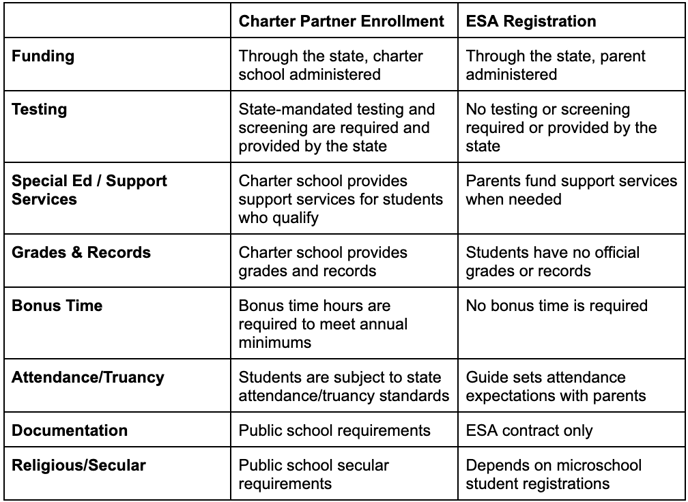Parents enrolling their child in a Prenda-associated microschool in Arizona have options as to how they fund their child’s microschool education. They can either enroll through a charter school partner or obtain funding through the Empowerment Scholarship Account (ESA) program.
Microschools with even one partner-enrolled student are subject to the restrictions and standards of a public charter school. Please talk to your guide about what their plans are for their microschool. The differences between partner enrollment and ESA registration are outlined in the following chart and addressed in greater detail below.

Funding
Both partner-enrolled and ESA-registered students are funded by the Arizona Department of Education.
For partner-enrolled students, the money is directed from the state to the partner charter school, who pays Prenda, who then pays the guide as an independent contractor. Parents don’t see or touch any money. Contact Prenda for the current partner charter schools.
For ESA-registered students, parents have access to the funding allocated for their child via an online ClassWallet. They can spend funds on ESA-approved providers to customize their child’s education. As an ESA-approved provider, Prenda can accept ESA funds. Guides’ microschools are completely independent businesses from Prenda. Prenda serves as the guide’s agent for payment. After receiving payment through ClassWallet, Prenda forwards guide fees to the guide and retains a fee for the Student Bundle of resources it provides to guides. Parents may have funds left over to provide other learning opportunities for their child.
Testing
Charter schools are publicly funded and are required to have their students meet specific testing requirements (contact the charter partner for details), including screenings for hearing or dyslexia. Requirements also include testing that students are generally meeting state standards and benchmarks. For example, partner-funded students enrolled in Prenda-affiliated microschools in Arizona complete Arizona's Academic Standards Assessment (AASA) for students in grades 3-8 annually in the spring.
ESA-registered students are not required to take these screenings or benchmark tests. Parents can seek outside access to some screenings. However, students registered in a microschool powered by Prenda can take Prenda-sponsored benchmark assessments to see the grade level of their work or to place them at their learning frontier.
Special education and support services
Students enrolled through charter partners are guaranteed access to support services if they have special needs. Students who qualify for exceptional student services will get an IEP or 504 plan that outlines the services that can help them be successful. Charter partners are a subset of public schools and are therefore required to provide accommodations outlined in an IEP or 504 plan.
Students registered with Prenda through ESA funding are not eligible for supplemental services. In most cases, if the student needs an accommodation, the parents are responsible for arranging and paying for it.
Under the Americans with Disabilities Act, all microschools are required to provide “reasonable accommodations” for individuals with disabilities, provided such accommodations do not result in a fundamental alteration in the nature of a microschool’s program. Accommodations are addressed on a case-by-case basis with the guide.
Grades and records
All students enrolled through charter partners are enrolled in a specific grade level, receive report cards, and have records of their completion of the grade. Parents can access these grades and records by requesting them from the charter partner if their child withdraws and starts at a new school.
Students registered with Prenda through ESA do not have an official student record. Parents have the option to keep records of student projects or portfolios. If the family moves or the student wants to enroll in a more traditional education institution, the student likely will need to undergo placement testing to assess their grade level.
Bonus time
Students enrolled through charter partners must complete a minimum number of hours each school year based on their grade level. Prenda-associated microschools meet for fewer hours weekly than traditional schools, so families make up the learning hours by completing activities outside of the microschool to supplement their child’s learning. These bonus time hours are logged weekly by parents to demonstrate to the charter partner that the student is benefiting from the expected amount of learning time each year.
Students registered with Prenda through ESA do not need to complete bonus time hours. We encourage all Prenda families to supplement their child’s education with activities and learning opportunities outside the microschool, but there are no requirements to do so.
Attendance/truancy
Students enrolled through charter partners are subject to the attendance expectations and truancy laws of their state. In Arizona, that means students can only have a certain number of excused or unexcused absences annually to complete a grade.
ESA-registered students are not subject to these laws. Guide sets attendance expectations with parents of their students. Prenda does not intervene unless it appears either that a student's welfare may be in danger or that learning is not taking place. Prenda strongly encourages all microschool students to make every effort to attend as many school days as possible to advance their learning and make class activities and projects more successful for everybody.
Documentation
Students enrolling with charter partners need to provide the following documents to Prenda upon enrollment: child’s birth certificate, proof of residency, proof of immunizations, guardianship (where applicable), and any IEP/special services documentation.
ESA-funded students only need to provide their state-issued ESA contract to Prenda upon registration. If they prefer, parents can black-out the dollar amount they receive from the state when they submit their contract. Other documents may need to be provided to the state when the family applies for ESA funding.
Religious/Secular Curriculum
Microschools with any partner-enrolled students are subject to the same rules as public schools. They cannot endorse any specific religion or include religious teaching as part of their curriculum. They cannot exclude students based on their religion.
Microschools that are made up exclusively of ESA-funded students can include religious practices or instruction and can make admissions decisions based on the religion of their students.
